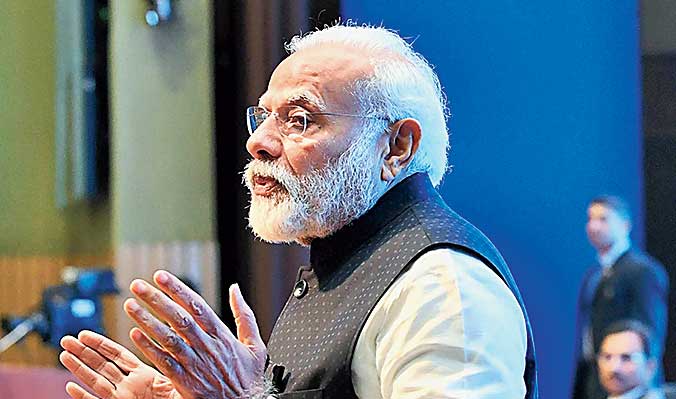Bangladesh on Monday informed India that Mujibur Rahman’s centenary celebrations had been postponed, assuaging Indian worries about Prime Minister Narendra Modi visiting Dhaka for the March 17 event amid street protests against the invite to him.
“Prime Minister Sheikh Hasina has personally written to the Indian PM informing him about the rescheduling of the celebrations we had planned earlier,” Bangladesh foreign minister A.K. Abdul Momen told The Telegraph over the phone.
A similar letter was sent to Congress president Sonia Gandhi, who was to be in Bangladesh on March 26 to attend one of the many events that would make up the year-long celebrations.
The March 17 event, planned at the National Parade Ground in Dhaka, was to officially launch the centenary programme. The decision to postpone it came at a meeting Hasina had convened late on Sunday night after Bangladesh recorded its first coronavirus cases.
“We had planned to get more than one lakh people at the programme. We will still hold the programme that day, but in a subdued manner and without any gathering,” Momen said, expressing regret that the event had to be scaled down.
Raveesh Kumar, Indian external affairs ministry spokesperson, confirmed the receipt of the letter from Dhaka.
“The Government of Bangladesh has advised us that fresh dates for these commemorative events will be conveyed later. In this context, (the) Prime Minister’s visit to Bangladesh next week at the invitation of HE Prime Minister Sheikh Hasina is being deferred,” he said.
Multiple sources in the two countries said the deferment had come as a relief for the Indian foreign policy establishment, which felt nervous seeing the protests against Modi’s impending visit gather steam in Bangladesh.
Although the Hasina government said these were stray protests and the Bangladeshi media chose to overlook them, thousands marched in Dhaka last week to condemn the Delhi riots and demand the cancellation of Modi’s visit.
Opposition leader Mirza Fakrul Islam Alamgir, secretary-general of the Bangladesh Nationalist Party, which has an alliance with the hard-line Jamaat-e-Islami, had questioned the timing of Modi’s planned visit.
“It’s good that (Narendra) Modi is coming, but you’re coming at a time when one of the worst communal riots has taken place in Delhi…. Newspapers and magazines are alleging that your party was involved in the rioting. So, you (Modi) need to think how appropriate it will be for you to come to Bangladesh at this time and how fruitful it will be,” he said.
The BNP does tend to play the anti-India card, and Muslim-majority Bangladesh has indeed seen a steady rise by fundamentalist groups in the past few years. Still, the past few months have, especially after the passage of the Citizenship Amendment Act, witnessed a surge in anti-India sentiments even among ordinary Bangladeshis.
“Even liberal people have been expressing unhappiness at what’s happening in India, which had always been a model of secularism that people like us wanted in our country,” a senior journalist said.
“Because of our secular and liberal values, the hardliners have always called us India’s agents and we have tried to fight them. In recent months, we have had to be silent as it has become increasingly difficult to defend what’s happening in India.”
In December, Bangladesh had cancelled scheduled India visits by Momen and home minister Asaduzzaman Khan amid murmurs that the ruling Awami League was unhappy at the Indian leadership’s repeated references to alleged minority persecution in Bangladesh during the Parliament debate on the CAA.
That the resentment at the developments in India has spread beyond the fundamentalist forces became clearer last week when organisations like the Alliance for Resistance of Terrorism and Communalism, a rights body that has fought against fundamentalism, held a demonstration in Dhaka condemning the Delhi riots.
Dhaka University students’ union vice-president Nurul Haq held a news conference last week to announce that the student community would try to “stop the (Modi) visit at any cost” before threatening a march to the Indian high commission.
“Had the visit taken place, it would have been difficult to prevent protests against the Indian Prime Minister. It would have indeed been an embarrassment for both countries,” a source in Dhaka’s elite diplomatic circles said.
He said the street protests of the past few weeks had likely prompted the Dhaka visit by Indian foreign secretary Harsh Vardhan Shringla, who had earlier served as high commissioner to Bangladesh.
“He (Shringla) had probably come here to assess the situation. There’s little doubt that he got a feel of how India’s stock has dipped. The coronavirus scare has surely spared the Indian PM’s blushes,” he said.
Bangladesh is certain to celebrate Mujib’s birth centenary on a huge scale after the coronavirus crisis blows over.
Momen said the Bangladesh government had been looking forward to Modi’s visit eagerly as several key treaties were to be signed. Among these was an agreement on sharing the waters of six rivers, excluding the Teesta, which remains a thorn in bilateral relations.
Although Modi’s visit has been cancelled, Momen said, the two countries would work towards clinching these agreements soon.










